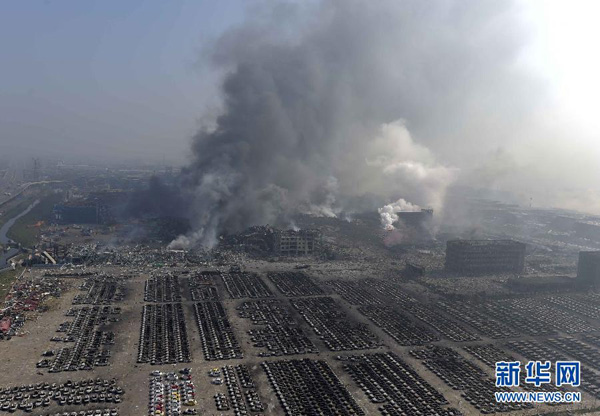No influence of Tianjin blasts on air quality in Beijing
 0 Comment(s)
0 Comment(s) Print
Print E-mail China Daily, August 13, 2015
E-mail China Daily, August 13, 2015
|
|
|
Huge explosions hit an industrial area in northern Chinese port city of Tianjin late on Wednesday, triggering a blast wave felt kilometers away.[Xinhua] |
Beijing denied the rumors that the blast in the 150-kilometer away Tianjin influenced air quality in the capital, despite real-time air quality data in Tianjin showed the northern municipality saw worsened air after an explosion hit warehouses in the Binhai New Area, the first national comprehensive reform and innovation new area approved by the State Council.
The capital currently experiences wind from the southwest and west, and Tianjin is located in the southeastern direction so the pollutants from the blast will go to the Bohai sea, thus having no influence on the capital, the Beijing Environmental Protection Bureau said on Thursday.
Besides, the monitoring stations located in the southeastern region, in the direction of Tianjin have not detected any abnormal situation in the air quality or sudden rise of air pollutants on Thursday morning after the blast.
All the major air pollutants indexes are at normal levels, according to the official statement released on the bureau’s official microblog account.
Tianjin municipal authority has also not released any special alerts on air quality after the blast in spite of circulating online rumors that the explosion of the chemical materials piled in the warehouse may have severely polluted the air and may be poisonous
The real-time air quality data showed the air quality index of the two monitoring stations near the blast site were around 160, or moderate pollution, the third-highest level in the six-tiered air quality system, according to the data from municipal air quality monitoring website at 9 am.
However, the average concentration of PM2.5, the airborne pollutants with a diameter of 2.5 microns, increased quickly, from 76 micrograms per cubic meter to 117 micrograms per cubic meter in the past 24 hours in a nearby station, the website showed.
Another airborne pollutant PM10 saw the average concentration increased from 129 micrograms per cubic meter in the past 24 hours to 206, it said.







Go to Forum >>0 Comment(s)